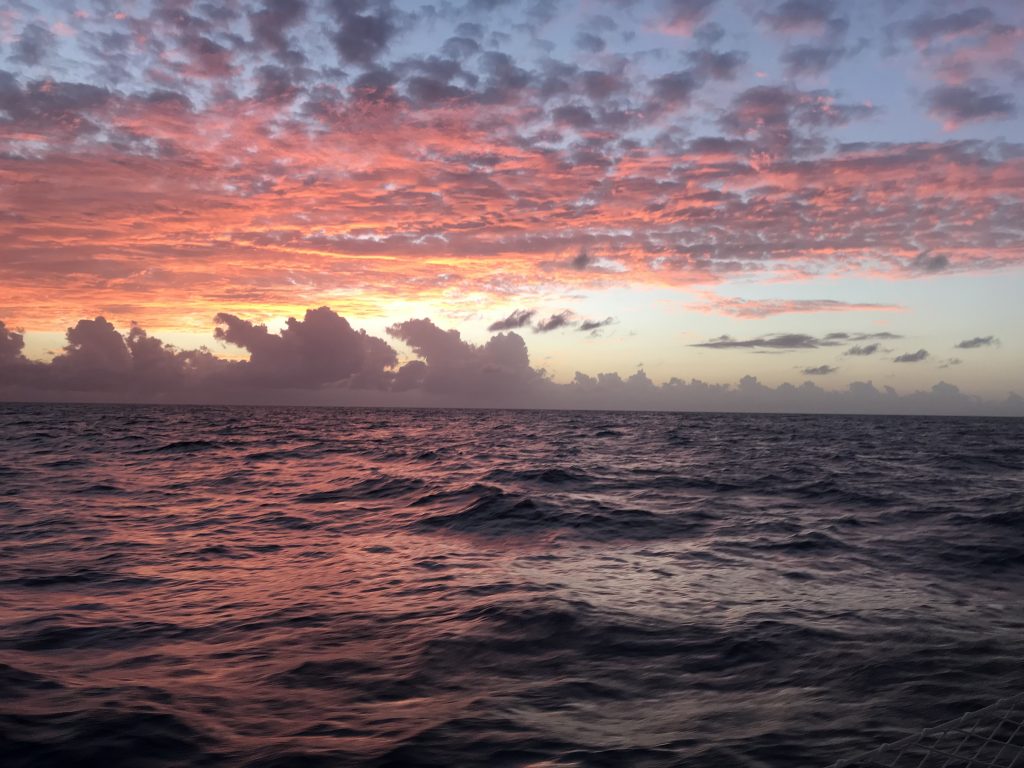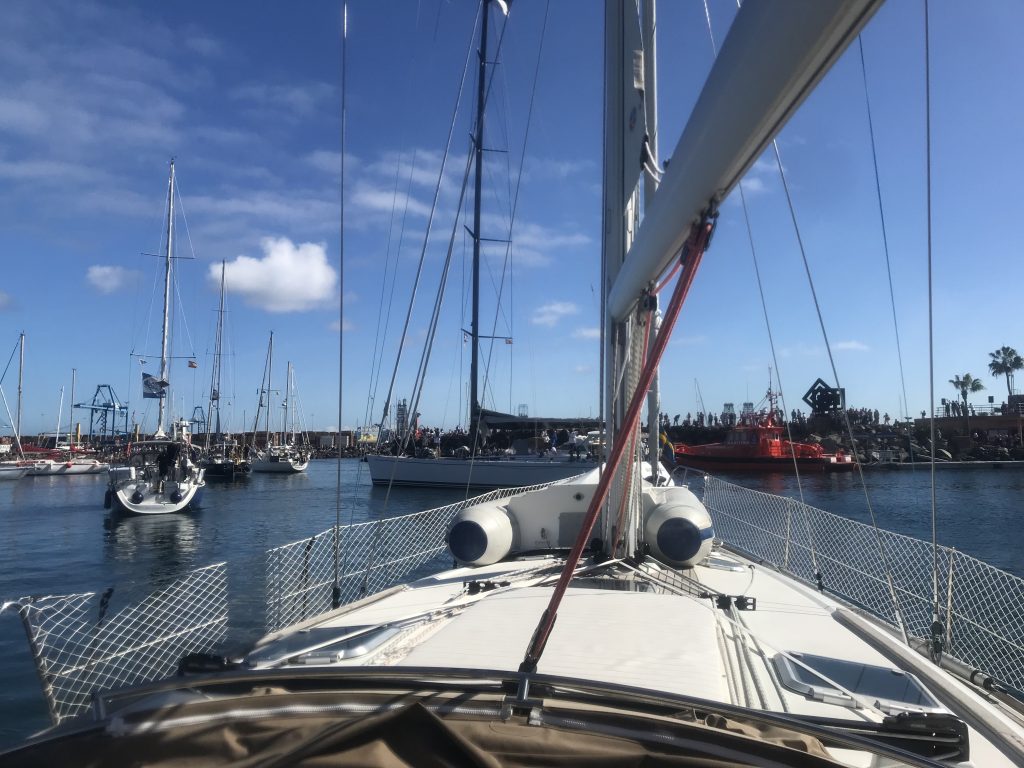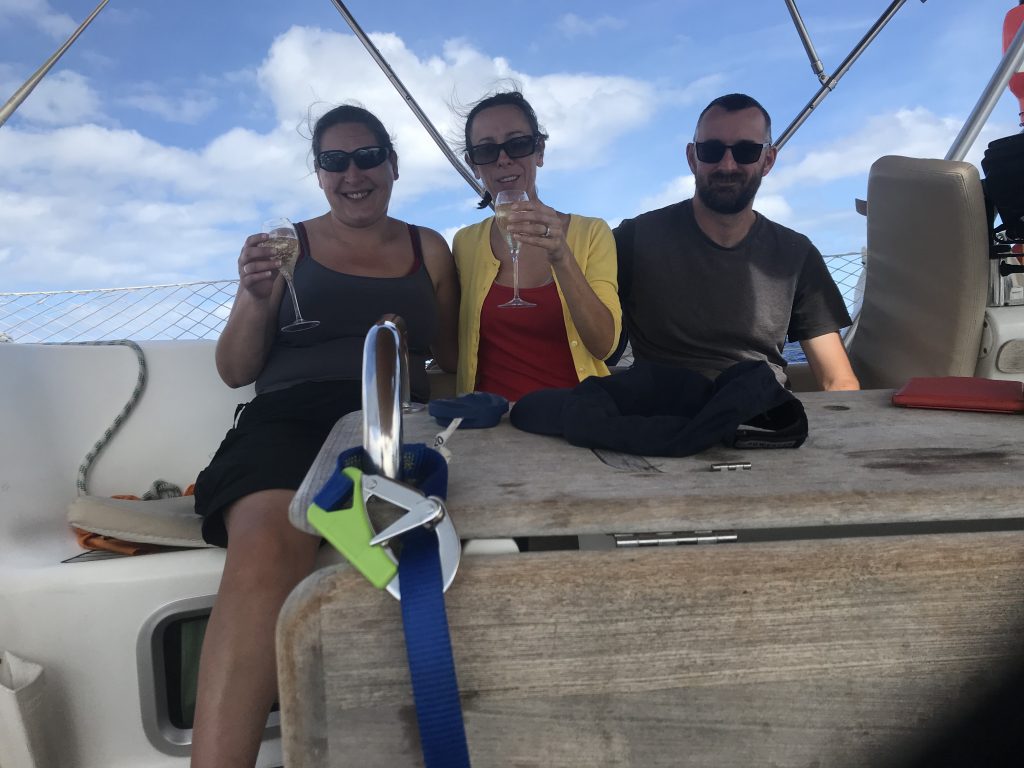
We are finally in the Caribbean following 18½ days sailing the Atlantic ocean. Completing the ocean crossing has certainly felt like a great achievement. We arrived 2 days earlier than we had planned. The chart plotter on the boat gives an ETA depending on speed. It felt good watching this slowly change, but I did find the crossing quite difficult. There was constant movement backwards and forwards which made my seasickness worse, and we also had to be careful to conserve water and power. We were worried there wouldn’t be enough power to run the fridge, freezer and water maker but were able to manage this. Though sometimes this meant keeping all the lights off and not charging devices for the boys.
Leaving Las Palmas

There was a couple of tense moments as we left Las Palmas – a lot of boats all heading in the same direction makes for plenty of hazards. We did have a lovely send off though: we have met a lot of other boat families, especially in Almerimar and La Linea, a few of them were going to cross the Atlantic later in a separate group but had arrived in Las Palmas to see us and some other boats off. They yelled “Hullabaloo” as we sailed past them, giving us a bit of a fright at first.
On our way
I was seasick the first 2-3 days but was pleased when the nausea went away, the constant movement as the boat hit the waves was harder to adjust to. It is hard to describe but it felt like I just couldn’t relax. One swell was particularly bad. About 5 days in it hit as I was about to cook dinner and I was not holding on. I hit my ribs really badly and was in significant pain and bedridden for 18 hours. Pretty sure I cracked my ribs. I have slowly improved, though even now 9 weeks later I still have to be slightly careful.
Cooking meals was always my least favourite time as the movement felt worse down in the cabin. I spent most of my time in the cockpit looking out to sea, watching for whales and dolphins, and chatting to Dawn as I waited for the days to pass. We saw whales 3 times and dolphins 4 times. They would swim past and around the boat. It was amazing to see them turn over in the water and occasionally jump out. Apart from this though, the first week was definitely the most difficult – especially as we had most or our breakages then. Rips in the sails, lines breaking and our whisker pole for downwind sailing snapping all made the journey slower and more difficult.
Hitting the halfway mark

Reaching half way was a great turning point, it felt like we were making progress. There had been some days that I just didn’t want to get out of bed but the weather was getting better, and we had seen some lovely Minke whales jumping out of the ocean. My ribs had started to improve and everything started to feel easier. The boys seemed to cope with journey really well – though they didn’t have to do night watches so I’m sure the 10 hours of sleep they got a night helped. Finlay even said to me he felt special to be doing the journey as not many kids his age had crossed the Atlantic. I also felt like I’d learned more about sailing in those 18 days than the previous 4 months, though I still need to work on the jargon.
Arriving at St Lucia
We reached the finishing line in St Lucia at 10.32pm but unfortunately got a line round our propellor as we were bringing in the sails. We anchored in the bay just outside the marina, Neil thought he would be able to sort out the line in the morning once it was light (and he did) so it just made sense to wait till then. We were almost there, and at anchor there is much less movement. It was actually really hard for me to get to sleep despite the very strong gin and tonic (there had been no alcohol on the journey as we needed to be sober for the night watches). I had got used to the bed moving and it felt very strange that the boat was so still. I also felt a bit numb – we had finished the crossing but it wasn’t quite over yet.
When we finally made it into Rodney Bay, St Lucia and got a berth in the marina I had an amazing sense of relief finally being on land. I felt very emotional and tired and wanted to hug everyone. The rum punch the ARC delivered when we arrived at 7am really helped me out.
It was great talking to all the other ARC yachts and hearing about their journeys. Some had a very problem free journey, others had even worse breakages than us. The catamarans are bigger with more living space and tend to be more stable and usually faster so they didn’t have such a bumpy ride. A couple of boats had significant problems, one with a broken water maker which means very tight water conservation affecting quality of life on the journey. Another lost their mast so had to motor all the way with other boats helping out with fuel. A few had to redirect to Cape Verde before coming along to St Lucia which added significant time to the journey. The ARC organises some social events so we can all celebrate together while recovering. Slowly though most of the ARC boats moved on along their way. We spent 2 weeks in St Lucia to decompress and relax then it was time to sail the Caribbean.
One response to “Getting to the Caribbean”
Great to read about the crossing. Hope you’re enjoying the Caribbean… it’s been snowing here! Cx